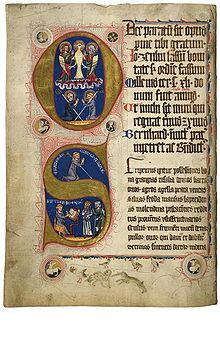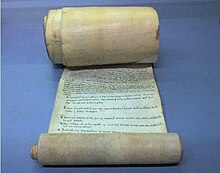Urbar (directory)


An Urbar or Latinized Urbarium is a directory of property rights of a manorial lordship and the services to be provided by its land subjects ( landholders ). It is an important economic and legal source of the medieval and early modern feudal system . The expression is also used for valid and stock books and interest registers . Depending on the region and the document holder , the terms Salbuch , Saalbuch , Berain , Zinsverzeichnis, Heberegister, Erdbuch and (Zins) -Rödel or Rodel are also common for these directories in German-speaking countries .
The term Urbar is derived from the Old High German “ur-beran” or the Middle High German “erbern” for “bring out”, “profitable property” or “bring a profit”. It can only be proven from the 13th century and refers to records of properties, taxes and services of a manor (e.g. a monastery) or a villication created for economic, administrative or legal purposes . Urbarial writings are, with sometimes complex genealogical references between concept and execution or fair copy, either strips of parchment sewn together to form Rödeln (lat. Rotulus ) or, transferred from these, layered codices .
In the early Middle Ages, representatives of the respective landlord went to the places they knew where claims existed in order to create a land register. They sworn men of good standing and asked them about local customs and the obligations of the local familia . The information given orally and in the vernacular was initially transferred almost exclusively in Latin and documented in writing. Mostly Hube for Hube (Low German hoof ) was performed with the people who live in them and their duties. The accuracy of the recordings differed so much that it can be assumed that many obligations were regulated by local customs and therefore did not have to be specifically listed.
development
Land records could be used in court, as evidenced by a document by Pippin I of Aquitaine from 828. In a copy of a land register from the early 13th century there is an "instruction manual" on how these "little books" were used in the event of a dispute: It comes from Cesarius von Milendonk , who in 1222 created the land register von Prüm , a monastery in the Eifel, copied. He addressed the future user of his copy directly and gave instructions on how to use the "book" in court. For this purpose, the representatives of the landlord, i.e. the Abbot of Prüm, met with lay judges and members of the family on the farms . It becomes clear how the oral procedure was of far greater importance at this time, and how much writing could be used as a "threatening gesture":
“Whoever is in court with the lay judges and the Familia should be careful not to tell them beforehand what is to be found in this book. Rather, one should carefully inquire of them about the rights of the Church, because nothing (i.e. not a single legal claim) is described satisfactorily in every respect, others are severely neglected that are not written in this book. For example, here at Birresborn (near Prüm) the corporation and barrel interest are not mentioned, but both are paid. One carefully inquires of them the rights of the Church and hears about them; and if they should keep silent about anything that is expressed in this book, then this is deliberately held against them, and so they will be all the more afraid. "
Certainly Cesarius overestimated the intimidating effect of the book, but his statement suggests how the land register was dealt with. His instructions also show that the former abbot did not value the completeness of the land register very highly.
While in the early and high Middle Ages the arable records were mostly exhausted in cursory property lists or summary tax registers, in the late Middle Ages they were replaced by comprehensive property descriptions of a specific economic system based on private property management and inheritance (rule, office, court, property, neighbors, Loan takers, interest payments (in kind or money), mortuary ). In addition, more wise passages , the feudal oath of loyalty to be made by the landholders , the regular appointments of the thing courts and their resolutions were included in Urbare , so that the content of different types of text overlapped. Freiburg, for example, owes the tradition of the oldest version of its town charter to a copy in the Urbar (" goods book ") of the extra-urban Cistercian monastery Tennenbach . Since the 13th century, land registers have been an important instrument for the organization of the constitutional sovereignty and in the German-speaking area after 1300 they were increasingly written or translated into the national language.
The increased consideration of urbarial source texts in the context of critical, commented full-text editions in the recent past has made Urbare, with an overall good tradition, an important mediaevist carrier for both the areas of regional and economic history as well as the social and linguistic history of the Middle Ages.
example
The land book of Emperor Charles IV is considered an outstanding example of a sovereign land register .
literature
- Dieter Hägermann : Urbar. In: Lexicon of the Middle Ages . Volume VIII. Stuttgart / Weimar 1999, Sp. 1286-1289.
- Wolfgang Kleiber : Urbare as a linguistic historical source. Possibilities and methods of evaluation. In: Preliminary work and studies to deepen the history of the South West German language, ed. v. Friedrich Maurer , Stuttgart, Kohlhammer, 1965 (also published in the series of publications Research on Upper Rhine Regional History , Volume XVII, Freiburg, Eberhard Albert Verlag, 1965), pp. 151–243.
- Wolfgang Kleiber: The emergence of the German language in domanial legal sources (Urbaren) of Southwest Germany between 1250 and 1450. In: Alemannisches Jahrbuch 1973/75 (Alemannica, landeskundliche contributions, Festschrift for Bruno Boesch ), Bühl, Konkordia, 1976, pp. 202-220 .
- Ludolf Kuchenbuch : Rural society and monastic rule in the 9th century. Studies on the social structure of the family of the Prüm Abbey . Wiesbaden 1978
- Gregor Richter: Stock books or land register doctrine. Auxiliary scientific principles based on sources from Württemberg . Stuttgart 1979 (Publications of the Baden-Württemberg State Archives Administration 36).
- Roger Sablonier : Writing down and ruling practice. Urbarial documents in late medieval use. In: Pragmatic Dimensions of Medieval Writing Culture , Munich 2002, pp. 91–120.
- Alfons Schäfer: The oldest Zinsrödel in the Badischer Generallandesarchiv (Karlsruhe). Rödel as a forerunner and preliminary stages of the land register. In: Zeitschrift für die Geschichte des Oberrheins 112 (1964), pp. 297–372.
- Christhard Schrenk : Methods of evaluating early modern land registers using the example of the Orsinger land register from 1758. In: Writings of the Association for the History of Lake Constance and its Surroundings , 102nd year 1984, pp. 153–162 ( digitized version )
- Markus Wolter: The newly found, so far oldest land register of the women's choir in Säckingen. Annotated edition. In: Journal for the History of the Upper Rhine , Volume 155, Stuttgart, Kohlhammer 2007, pp. 121–213; Text edition and index overtaken by the corrected reprint in: Zeitschrift für die Geschichte des Oberrheins, Volume 156, Stuttgart, Kohlhammer 2008, pp. 591–665; see. Entry with illustrations in the Marburg Repertory. Revised version also as FreiDok publication by the University of Freiburg im Breisgau, 2011.
Web links
- Literature in the bibliographic data collection on the historical auxiliary sciences
- Keyword Urbar . In: auxiliary scientific bibliography
- Urbare in the manuscript census, handwritten transmission of German-language texts from the Middle Ages
- Norman Grüneberg: The more recent research on the Carolingian arable land
- Anne-Marie Dubler : Urbare. In: Historical Lexicon of Switzerland . January 14, 2014 .
Individual evidence
- ↑ Hannes Obermair : "Hye a note our dear frawn werch ...": The land register and legal book of the Marienpfarrkirche Bozen from 1453/60. (= bz.history 2). Bolzano City Archives , Bolzano 2005.
- ↑ Urbar , f., N. M . In: Jacob Grimm , Wilhelm Grimm (Hrsg.): German dictionary . tape 24 : U – Uzvogel - (XI, 3rd section). S. Hirzel, Leipzig 1936, Sp. 2374-2376 ( woerterbuchnetz.de ).
- ^ Matthias Bader: Urbare. In: Historical Lexicon of Bavaria . November 19, 2014, accessed on 25 November 2017 .
- ↑ Alfons Schäfer: The oldest Zinsrödel in the Badischer Generallandesarchiv (Karlsruhe). Rödel as a forerunner and preliminary stages of the land register. In: Journal for the History of the Upper Rhine (ZGO), 112 (1964), pp. 297–372.
- ^ Ludolf Kuchenbuch : Rural society and monastic rule in the 9th century .
- ↑ This is the conclusion Ludolf Kuchenbuch comes to in The Respect for the Old Book and Fear of the New. Cesarius von Milendonk created a copy of the Prümer Urbar from 893 in 1222. In: Historische Anthropologie . 3, 1995, pp. 175-202.
- ↑ Wolfgang Kleiber: Urbare as a linguistic historical source. Possibilities and methods of evaluation. In: Friedrich Maurer (Ed.): Preparatory work and studies to deepen the Southwest German language history. Stuttgart, Kohlhammer, 1965 (also published in the series of publications Research on Upper Rhine Regional History. Volume XVII, Freiburg, Eberhard Albert Verlag, 1965), pp. 151–243.
- ^ Josef Hartmann : The archival sources. An introduction to their use . Ed .: Friedrich Beck , Eckart Henning . Verlag Hermann Böhlaus successor, Weimar 1994, ISBN 3-7400-0882-2 , 3rd official books. Types and forms of official books in city and state administration. Lists of property and taxes (land records, inheritance books, inheritance registers), p. 93–95 , here p. 94 .



